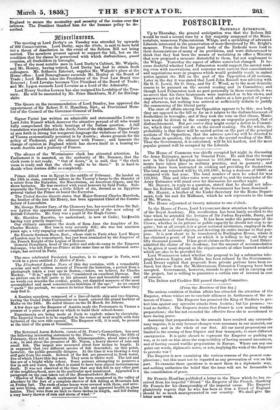POSTSCRIPT.
SATURDAY AFTERNOON.
Up to Thursday, the general anticipation was that the Reform Bill would be read a second time by a fair majority composed of the Minis- terialists, numerous Palmerstonian Whigs, and a sprinkling of' advanced Liberals interested in the preservation of seats threatened by Mr. Bright's measure. From the first the great body of the Radicals were loud in their denunciations of many of its provisions, and were disheartened to think that they had been the means of sustaining in office a Ministry that now proposed a measure distasteful to them, but not unpleasant to the Whigs. Yesterday the aspect of affairs somewhat changed. It be- came doubtful whether Lord Palmerston would support the second read- ing even with reservations, and rumours were current that consultations and negotiations were in progress which would probably result in united action against the Bill on the part of the Opposition of all sections. Later in the day it was stated that Lord John Russell was advising with Sir G. C. Lewis, Sir G. Grey, and Sir C. Wood, as to the most desirable course to be pursued on the second reading and in Committee ; and though Lord Palmerston took no part personally in these councils, it was no secret that his three lieutenants were instructed as to his views, and empowered to act for him. Thus stood affairs at a late period of yester- day afternoon, but nothing was arrived at sufficiently definite to justify the summoning of the liberal party.
The state of affairs among the Opposition appears to be this : as a body they are opposed to the bill so far as it relates to the disfranchisement of freeholders in boroughs ; and if they took the vote on that clause, Minis- ters would be driven to the country upon an unpopular ground, that of disfranchisement. But per contra they might accept a defeat in Commit- tee, which they could not do on the second reading. On the whole, the probability is that there will be united action on the part of the principal sections of the Opposition, that the adverse speaking will be directed to the clause in question, the adverse vote to the second reading of the Bill. Thus the Government, it is calculated, will be hit hardest, and the most popular ground will be occupied by the Liberals.


























 Previous page
Previous page